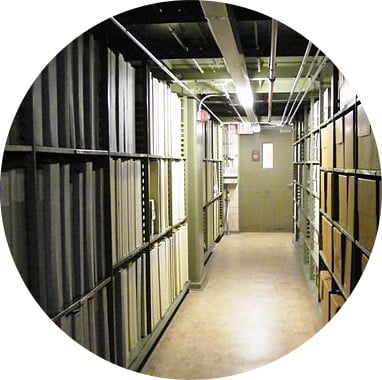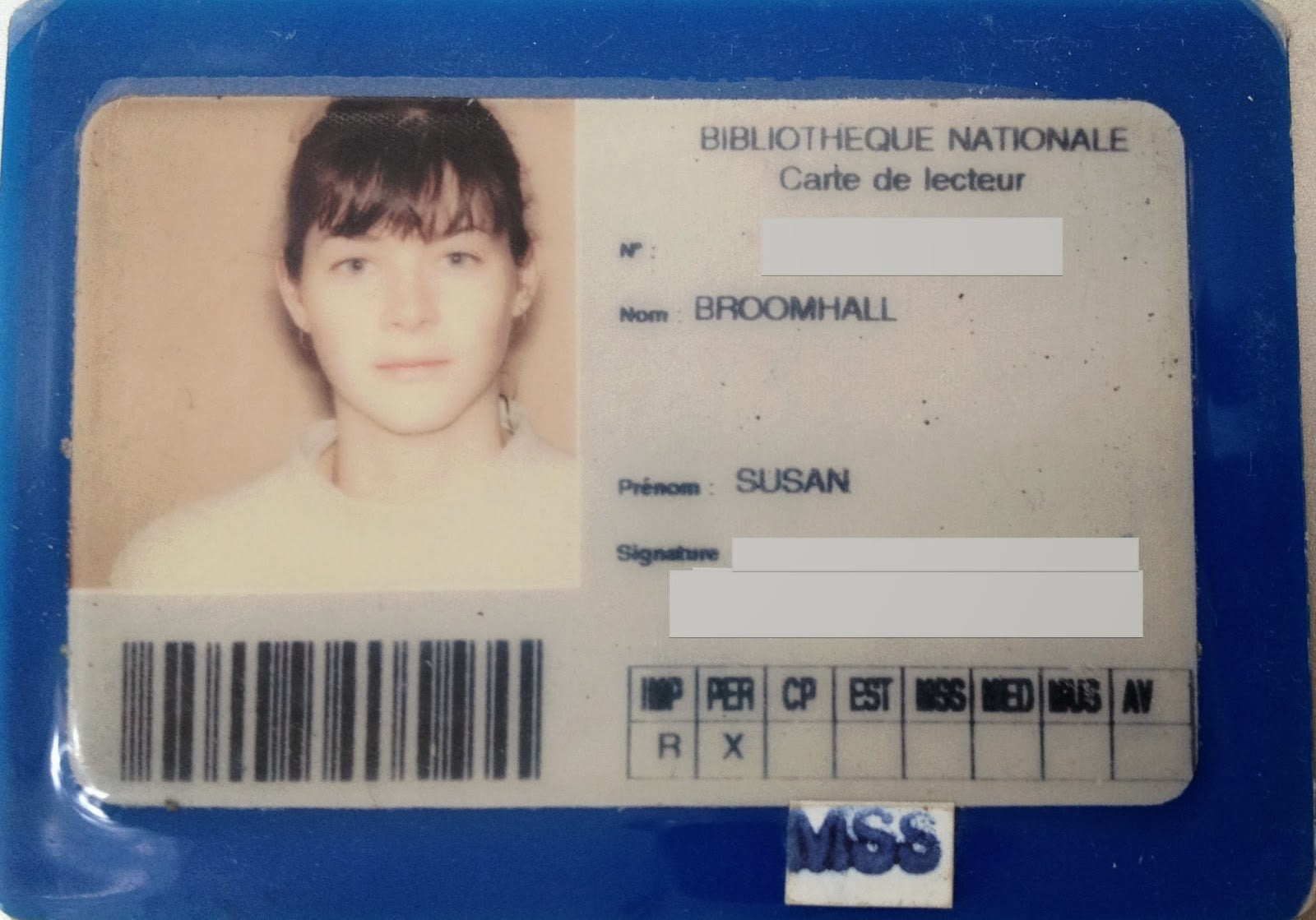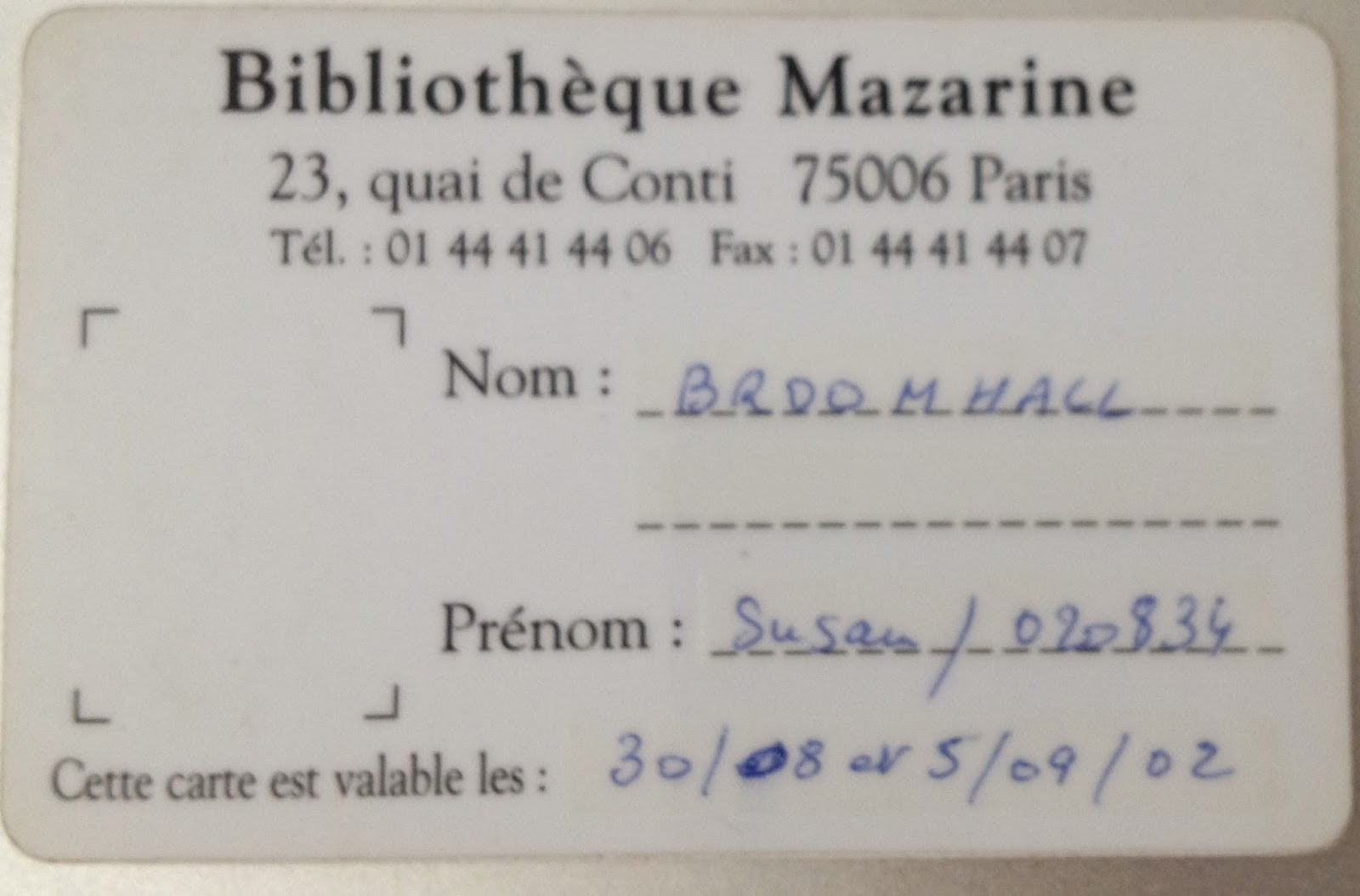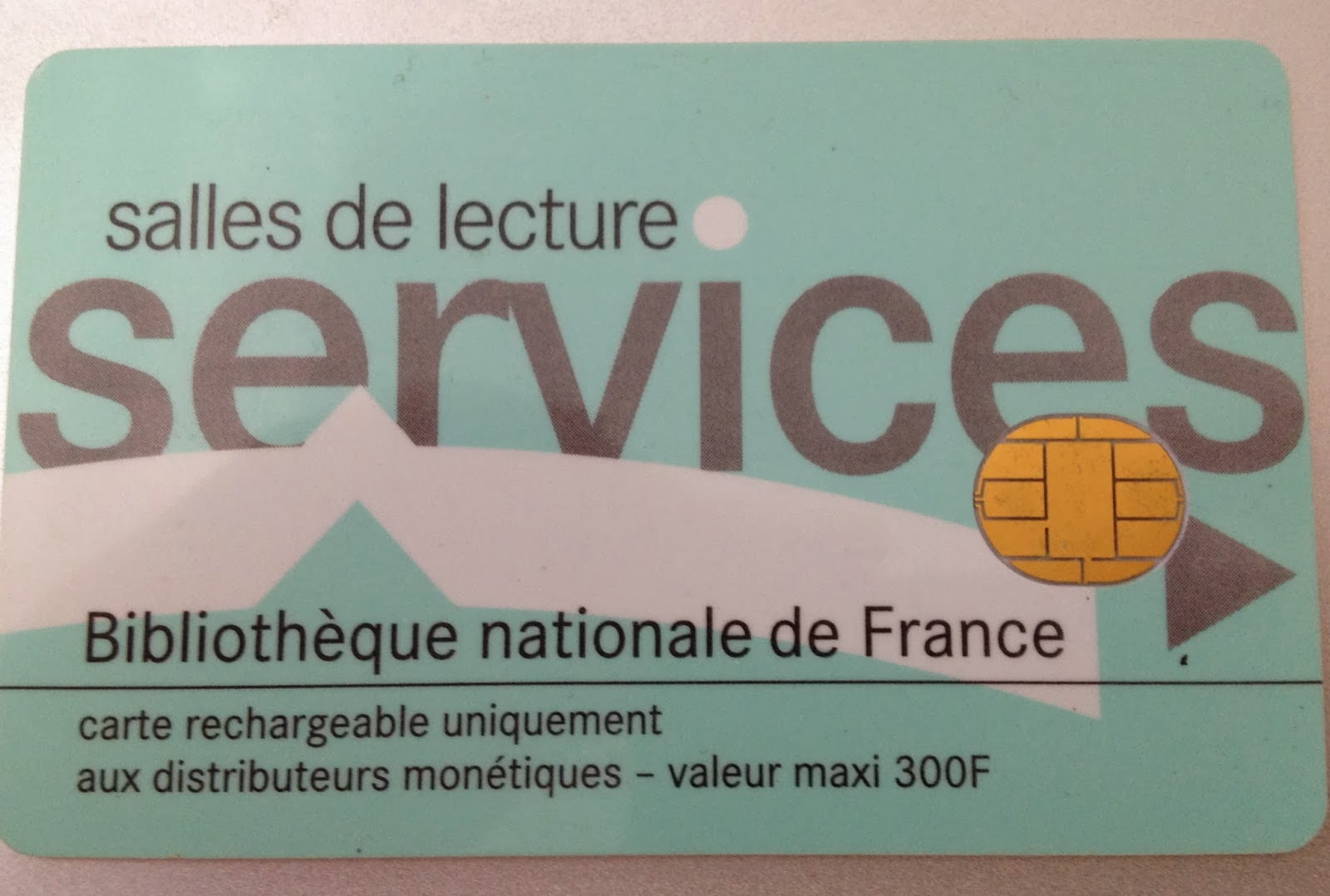French bureaucracy: out of the frying pan, into the archives…
 Over the years, I’ve spent a bit of time in archives, mainly in France. This is a part of the research that I love.
Over the years, I’ve spent a bit of time in archives, mainly in France. This is a part of the research that I love.
Of course there is the thrill of the document – touching and smelling it just as much as deciphering what it actually says. But there is also something satisfying about working out the systems of archives and libraries.
In general, French archival organisation is fairly consistent across the country, but each place has its own particular way of doing things.
I always feel a certain sense of achievement at just getting a reader’s card – sometimes it’s easy, a few forms to fill in and a brief conversation, in other places it feels like a full interrogation. And these are always the times when my French fails me, so instead of presenting as a serious professional sufficiently trustworthy to be let loose among precious documents, I come across as a stammering fool who can barely string three words together.
Since they’ve never actually sent me away, I’ve reconciled myself that at least I probably made someone feel good about themselves, or gave them a great story for dinner time about the idiot academic from Australia who turned up at the office that day.
And it always seems to be just at the point where I’m most stressed and demoralised and thinking I need to book my ticket home immediately because I’m clearly an imposter in this business, that they want to take my reader’s card photo. So I have a lovely collection of portraits looking panic-stricken, depressed or vaguely in shock.
This is my 1996 Bibliothèque Nationale reader’s card – I look like I’m going to pass out at any moment!Anyway, having passed all that gives me a strong sense of relief and working out how to order the documents, where to sit, where to collect them and so on seems like a breeze. But every now and then, you come across reasons why this process doesn’t quite work as planned, and here are some that I’ve experienced over the years.
1. “Your seven looks like a one.”
Yes, a classic Anglo-Saxon error. There’s nothing worse that having a 10-order-a-day system as some archives do and using up one of those precious requests putting the right number on the form, but using a seven without a line throughout it. This will look like a French 1, which has quite a long lead-in stroke (no idea of the technical term for that!).
This isn’t a mistake you repeat too often, I try to adopt French numbering as soon as I land, for fear that my passport won’t match the details I’ve written down and I’ll end up, Tom-Hanks like, in the transit section of Charles de Gaulle airport forever. (In an irrelevant segue, ask a French person to say that actor’s name – it will sound something like ‘Tom Onks’. I’m afraid I’ve never been able to think of him as anything else ever since.)
2. “You’ll need to have an interview with the Président de la Salle if you want to see that.”
 This is where I’ve requested a document that is restricted access in some way. For my line of research, it’s usually a manuscript that is in a fragile state and for which there is no microfilmed version to send you to instead. This is a variation on my comment above – at just the moment I need to look most professional, my French falls to bits and I manage the vocabulary and nuance of a three-year-old.
This is where I’ve requested a document that is restricted access in some way. For my line of research, it’s usually a manuscript that is in a fragile state and for which there is no microfilmed version to send you to instead. This is a variation on my comment above – at just the moment I need to look most professional, my French falls to bits and I manage the vocabulary and nuance of a three-year-old.
Still, they haven’t actually refused me yet.
Then I’ll be asked to sit in a special section which is usually right next to the Président’s desk, so you can be closely supervised. The white gloves often come out too, and you might be asked to use a book cradle to support the book and not open it too widely.
3. “That stack was bombed during World War Two”, “That set of documents was lost in the 1870 fire” and variations upon the same.
It’s a long time since I’ve used the British Library, but if memory serves, this first was one of the tick-a-box options on the Library’s returned and unfilled request form. To be honest, I’m not entirely sure I ever had an order fall into this category but it’s always intrigued and saddened me that there was such loss of files that a box like this is necessary.
The second and its variants occur more frequently, and it points to the infrequency with which catalogues are updated. Often the catalogues were compiled during the nineteenth century, often they are fantastically detailed – even transcribing whole documents, or just the bits the archivist thought were interesting – but they haven’t been amended since. Somewhere, I’m pretty sure I was using an eighteenth-century card catalogue.
The Bibliothèque Mazarine is a beautiful library with a very old card catalogue.*
Occasionally, an archivist (or perhaps a researcher) has scribbled in a new number, or crossed through an entry with ‘unavailable’, ‘lost’, ‘destroyed’ and the like. At this point, I become incredibly grateful for those archivists who thought their documents were funny or strange, or important to note down in full, because they may be as close as we are ever going to get to the source now.
4. “It’s lunchtime, ordering and delivery are suspended for two hours.”
Mostly a regional occurrence these days. I can’t decide whether it’s good or bad. It reflects a certain French lifestyle (or my imagined version of a French lifestyle) where families get together around a big outdoor table over lunch, or professionals go to swanky restaurants for alcohol-laden philosophical discussions.
“I really need to plan out my timing of requests carefully, making sure I’ve put my orders in before the suspension of service for lunch or the last hour of the day…”
My reality has usually been two hours eating a baguette on a park bench, not at all bad if it’s sunny, or worse – if it’s winter – hovering around the pathetic offerings of the coffee and chocolate vending machines. It’s amazing how far a Bounty (or ‘boonty’ as it sounds in French) can last when it means you have an excuse to stay out of the cold, or because you are on student-level finances.
Often I’m trying to get to a lot of archives in a really short period of days or just a week, so time is of the essence. In these situations, I really need to plan out my timing of requests carefully, making sure I’ve put my orders in before the suspension of service for lunch or the last hour of the day, and hoping I have made my sevens and ones look suitably French!
5. “You can’t leave the premises until you return the book you still have.”
This was quite a scary situation. I was trying to leave the Bibliothèque Nationale at the end of the day, when I discovered my exit barred. My card was registering as still having one book out. I went back to the ordering bench near where I was sitting and explained what had happened. ‘Well, so, you need to return it then,’ advised the librarian. I explained that I had. ‘No, you haven’t because your card says you haven’t.’
This was really awkward.
20 minutes later, he had checked my see-through plastic bag, sized up whether I could have possibly hidden it under my clothes, checked the table I was sitting at, under it, next to it, and so on. And he was still staring at me, as though I could somehow produce the book. Do you think, I asked hesitantly, you could check the store shelves perhaps? He looked appalled, this seemed to suggest a mistake might have been made at the library’s end…
By this time, it was about 5 minutes from closing time. With a very audible sigh, he picked up the phone to call someone in the stores. I was told to sit at the nearest desk, presumably under surveillance in case I scarpered (though I’m not sure where to, the toilets??).
“At least I probably made someone feel good about themselves, or gave them a great story for dinner time about the idiot academic from Australia who turned up at the office that day.”
10 minutes later, the library now completely empty as it was officially after closing time, I’d gathered a range of interested staff around, each one eyeing me up for my potential to have committed the theft, and loudly re-assuring each other that there was no way a book could have been re-shelved since the whole system was automated and the books scanned as they moved through the various points of the library collection. I was starting to wonder at this point whether I was going to need to call the embassy to assist at my formal arrest…
The phone on the collection desk buzzed. The collected salon fell silence. ‘Aha, mmm, aha’, we heard. The librarian put the phone down. ‘The book is there, you must have returned it without presenting your card,’ he said. I thought for a moment whether that was possible, and decided that, whatever the reality, since this outcome left me without a criminal record, it was worth apologising for and retreating quickly – ie, live to access another day.
6. “You give me your phone number, and I’ll give you the file.”
Yep, really. Many years ago now, I did get this response at one collection desk. It was not flattering, it was annoying and unsettling. Firstly I was so in the zone of what I was working on, I thought I’d misheard him, so I started to produce any identification I could think of – reader’s card, order form slip, passport – that might be the number he needed.
When I twigged what he did mean, then I was stuck thinking how to answer. ‘No’, seemed a bit blunt but token flirting and innuendo is a bit tricky in another language (or even in English for socially inept individuals like myself). I think I managed a fairly pathetic smile.
At this point, I think he realised this was not going to be the fun he’d imagined and handed the file over.This probably should have been the end of it, but it wasn’t. I went back to my desk and went over and over the conversation in my head, of course thinking up hilariously funny lines that would have been perfect and made me look awfully clever and sophisticated.
I’d completely lost the concentration I needed to get into the script of the document. I knew I’d have to spend the rest of the day going back and forth to collect other documents. Was I meant to come up with some witty repartee each time?
In the end, I didn’t order anything further. I waited til he went to the back room and handed in the document to another staffer. In fact, I didn’t return to that archive for over a year. Perhaps he thought it was going to be a passing compliment, livening up his day and mine – and perhaps for someone other than me, it might have been. But it was me, and it wasn’t, and it didn’t.
7. “It’s never happened before but you’ve ordered the same document that another reader has requested today…
…Who is looking at it right now. In fact, she is sitting at the table right next to your own.”
Yes, this really did happen, which is pretty weird when you are ordering obscure French texts from the sixteenth century on a hunt for printed writing by women. I think the staff were as intrigued by it as we were.
This “is pretty weird when you are ordering obscure French texts from the sixteenth century on a hunt for printed writing by women.”
And this is how I met Anne R. Larsen, fabulous scholar of early modern French women’s writings, at the BNF Réserve section. I had just completed my PhD (on sixteenth-century women’s writings) so Anne’s scholarship was all through my thesis, and front and centre in my mind. At first, we had a lovely chat in French because we each imagined the other was French, until we exchanged names and fields and realised we were an American and an Australian. It was the start of a great, mainly email-sustained, friendship.
This post was originally published on Susan’s blog, here.These are just a few of the funny things that have happened to me on the way to the archives, and I’m sure I can’t be alone in having some interesting adventures there, can I? I’d love to know what your experiences have been…
* Mercifully no photo required for short-term visitors but I must have been having a very bad day because it looks like my date of birth is in 1934 (which is about 40 years out!!), or perhaps it’s just my reader’s number for that visit… Image Credits2, 3 & 5. ©Susan Broomhall.
1. Archives, via Wikipedia.
3. Timeless Books, via Wikimedia Commons.
6. Salle de lecture Bibliothèque Mazarine depuis galerie, by Rémi Mathis on Flickr.











Terrific post, many thanks for contributing it. I’ve not used archives in France (yet), but I recognise almost all of the scenarios you cover from other French encounters. The story about meeting Anne Larsen is lovely and I bet you feel so lucky.